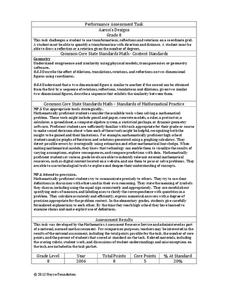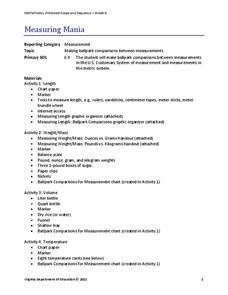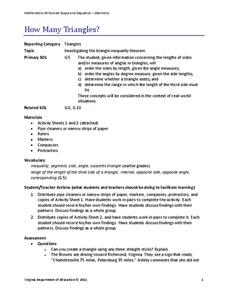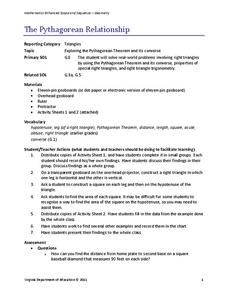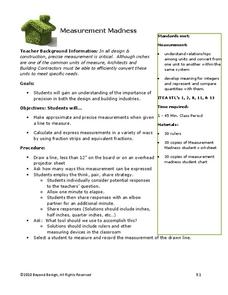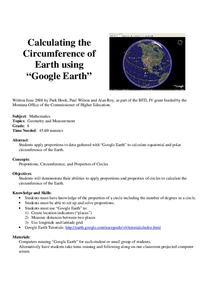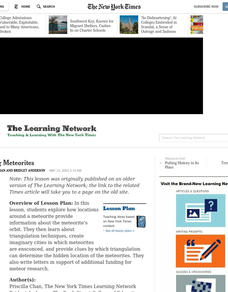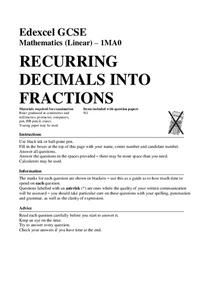Noyce Foundation
Which is Bigger?
To take the longest path, go around—or was that go over? Class members measure scale drawings of a cylindrical vase to find the height and diameter. They calculate the actual height and circumference and determine which is larger.
Inside Mathematics
Aaron's Designs
Working with transformations allows the class to take a turn for the better. The short assessment has class members perform transformations on the coordinate plane. The translations, reflections, and rotations create pattern designs on...
EngageNY
Properties of Dilations
Investigate dilations to learn more about them. The second segment in a series of 16 provides a discussion of properties of dilations by going through examples. The problem set provides opportunities for scholars to construct dilations.
EngageNY
Fundamental Theorem of Similarity (FTS)
How do dilated line segments relate? Lead the class in an activity to determine the relationship between line segments and their dilated images. In the fourth section in a unit of 16, pupils discover the dilated line...
Virginia Department of Education
Transformations
The coordinate plane is a popular place! Identify rotations, reflections, and dilations on the coordinate plane. Pupils work in small groups to match transformations of a figure with the description of the transformation....
Virginia Department of Education
Measuring Mania
Conversion immersion — it's measuring mania! A set of four activities teaches scholars to convert between customary and metric units. Resource covers unit conversions in length, temperature, weight/mass, and volume.
Virginia Department of Education
How Many Triangles?
Something for young mathematicians to remember: the sum of any two sides must be greater than the third. Class members investigates the Triangle Inequality Theorem to find the relationship between the sides of a triangle. At the...
Virginia Department of Education
The Pythagorean Relationship
Add up areas of squares to discover the pythagorean relationship. Small groups create right triangles with squares along each side. They calculate the areas of each square and notice the relationship. Groups construct other types of...
Mathed Up!
Loci and Constructions
A General Certificate of Secondary Education math review has class members make basic constructions. Using a protractor and a ruler along with a compass, pupils develop drawings of triangles with given measurements. Scholars use their...
Beyond Benign
Measurement Madness
Behind all good design and construction lies a perfect set of plans that are created by a person who knows his, or her, math! Youngsters practice using one of the key tools of the draftsman, the ruler, to practice measuring...
American Statistical Association
Speedster
Catch me if you can. Scholars collect data on reaction time by catching a falling ruler or by using an Internet app. They determine the median of the data, create graphs, and analyze the results. They also compare their data to the rest...
Curated OER
Calculation the Cricumference of Earth using "Google Earth"
Eighth graders investigate properties of circles. In this eight grade mathematics lesson, 8th graders apply proportional reasoning to data gathered with “Google Earth” to calculate equatorial and polar circumference of the...
Curated OER
Oodles of Noodles
Students investigate non-standard and standard measurement including inches and centimeters. They use different types of noodles as non-standard units of measurement comparing them to inches and centimeters.
Curated OER
Measure Up!
Discover ways to measure items without standard tools. In this measurements lesson, learners estimate how long certain objects are by measuring with a non-standard measuring tool. Students check their estimates with a ruler and share...
Curated OER
Measurement 2
In this measurement worksheet, middle schoolers use liner measure with a provided ruler to determine the distance between objects. Using a map scale, they evaluate the actual distance. Students may use their knowledge of proportions to...
Curated OER
Mapping Meteorites
After reading an article, "Cameras Capture a 5-Second Fireball and Its Meteorite's Secrets," space science superstars use the triangulation method to determine the location of a distant object. In-class activities and homework are...
Curated OER
Fraction City
Learners calculate equivalent fractions, solve the addition of fractions of like and unlike denominators, and compare fractions using fraction strips. They fold paper strips into equal parts, thirds, sixths, ninths, and twelfths, and...
Curated OER
The Metric System
Students practice converting metric measurements by completing the activities listed in this lesson. They first practice measuring common objects. They then convert metric measurements using the included worksheet.
Mathed Up!
Cumulative Frequency and Box Plots
Learn how to display data. Young data analysts watch a video to review how to create cumulative frequency histograms and box plots. They work on a set of questions to practice producing these data displays.
Mathed Up!
Algebraic Fractions
Learn ways to simplify algebraic fractions with a video that reviews how to simplify rational expressions by canceling common factors and how to add and subtract simple rational expressions. A worksheet tests pupils' understanding...
Mathed Up!
Recurring Decimals
Explore how to convert repeating decimals to fractions with an informative video that teaches young mathematicians how to translate between decimals and fractions. After viewing, individuals complete a set of problems to practice...
Mathed Up!
Direct and Inverse Proportionality
Direct your young mathematicians to a resource on direct and inverse variation. A video first reviews concepts on direct and inverse proportionality. Individuals then answer a set of questions in pure and applied mathematics...
Curated OER
Measuring Fun
First graders practice measuring. In this measuring lesson, 1st graders read the story How Big Is a Foot? by Rolf Myller. They measure a partner using standard (ruler) and nonstandard (feet) units.
Curated OER
Parallels and Distance
In this parallels and distance learning exercise, 10th graders solve 7 different problems related to the distance between a point and a line and the distance between parallel lines. First, they draw the segment that represents the...

